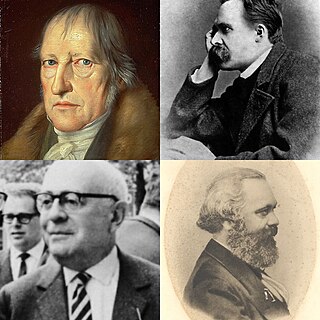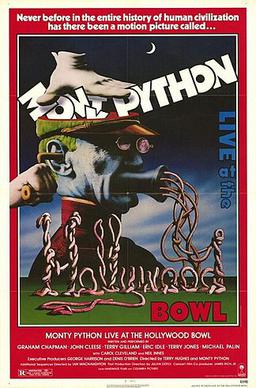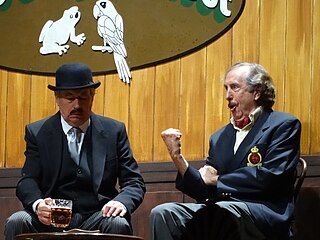
German philosophy, meaning philosophy in the German language or philosophy by German people, in its diversity, is fundamental for both the analytic and continental traditions. It covers figures such as Gottfried Wilhelm Leibniz, Immanuel Kant, Georg Wilhelm Friedrich Hegel, Karl Marx, Friedrich Nietzsche, Martin Heidegger, Ludwig Wittgenstein, the Vienna Circle, and the Frankfurt School, who now count among the most famous and studied philosophers of all time. They are central to major philosophical movements such as rationalism, German idealism, Romanticism, dialectical materialism, existentialism, phenomenology, hermeneutics, logical positivism, and critical theory. The Danish philosopher Søren Kierkegaard is often also included in surveys of German philosophy due to his extensive engagement with German thinkers.

Monty Python Live at the Hollywood Bowl is a 1982 concert comedy film directed by Terry Hughes and starring the Monty Python comedy troupe as they perform many of their sketches at the Hollywood Bowl. The film also features Carol Cleveland in numerous supporting roles and Neil Innes performing songs. Also present for the shows and participating as an 'extra' was Python superfan Kim "Howard" Johnson.
Modern philosophy is philosophy developed in the modern era and associated with modernity. It is not a specific doctrine or school, although there are certain assumptions common to much of it, which helps to distinguish it from earlier philosophy.

In the fields of philosophy, the terms obscurantism and obscurationism identify and describe the anti-intellectual practices of deliberately presenting information in an abstruse and imprecise manner that limits further inquiry and understanding of a subject. The two historical and intellectual denotations of obscurantism are: (1) the deliberate restriction of knowledge — opposition to the dissemination of knowledge; and (2) deliberate obscurity — a recondite style of writing characterized by deliberate vagueness.
"God is dead" is a statement made by the German philosopher Friedrich Nietzsche. The first instance of this statement in Nietzsche's writings is in his 1882 The Gay Science, where it appears three times. The phrase also appears at the beginning of Nietzsche's Thus Spoke Zarathustra.

The Bruces sketch is a comedy sketch that originally appeared in a 1970 episode of the television show Monty Python's Flying Circus, episode 22, "How to Recognise Different Parts of the Body", and was subsequently performed on audio recordings and live on many occasions by the Monty Python team.
"International Philosophy", commonly referred to as the Philosophers' Football Match, is a Monty Python sketch depicting a football match in the Munich Olympiastadion between philosophers representing Greece and Germany. Starring in the sketch are Archimedes, Socrates, Hegel, Nietzsche, Marx, and Kant. Palin also provides the match television commentary.

The Monty Python Instant Record Collection is the title of two compilation albums by the Monty Python troupe. The first was released in the UK and Canada in 1977 and drew from the group's first three studio albums, first live album, and first soundtrack album on the Charisma label, while the second was released in the US in 1981 and comprised tracks from their four albums released on the Arista label. Billed as "the pick of the best of some recently repeated Python hits again, Vol. II", the record sleeve was designed by Terry Gilliam. The UK/Canadian version originally featured packaging that folded out into a cardboard box resembling a large stack of record albums. An inner sleeve featured a spoof "Where Are They Now?" update on the members of the Python team.

"Candid Photography", better known as "Nudge Nudge", is a sketch from the third Monty Python's Flying Circus episode, "How to Recognise Different Types of Trees From Quite a Long Way Away" featuring Eric Idle and Terry Jones as two strangers who meet in a pub.

A History of Western Philosophy is a 1946 book by British philosopher Bertrand Russell (1872–1970). A survey of Western philosophy from the pre-Socratic philosophers to the early 20th century, each major division of the book is prefaced by an account of the historical background necessary to understand the currents of thought it describes. When Russell was awarded the Nobel Prize for Literature in 1950, A History of Western Philosophy was cited as one of the books that won him the award. Its success provided Russell with financial security for the last part of his life. The book was criticised, however, for over-generalizations and omissions, particularly from the post-Cartesian period, but nevertheless became a popular and commercial success, and has remained in print from its first publication.
This is an alphabetical index of articles about aesthetics.

The Instant Monty Python CD Collection is a box set released in 1994 of six CDs containing eight albums by the Monty Python troupe. It does not include the first Monty Python record, Monty Python's Flying Circus, whose rights are still owned by the BBC.
Buddhist thought and Western philosophy include several parallels.
The following is a list of the major events in the history of German idealism, along with related historical events.

Monty Python Live (Mostly) (also billed as Monty Python Live (Mostly): One Down, Five to Go) was a variety show by the Monty Python comedy group at The O2 in London in July 2014. Planned as a single performance for 1 July, it was expanded to 10 shows due to the high demand for tickets. It was their first live performance together in 16 years, the second without member Graham Chapman (who died in 1989) and the last with Terry Jones (who died in 2020).

A New History of Western Philosophy is a 2010 book by the British philosopher and theologian Anthony Kenny, consisting of a history of Western philosophy from the ancient Greeks to the present day. The book consists of four separate parts which were originally released separately during the period 2004–07. The book is dedicated to the memory of Georg Henrik von Wright.

A Short History of Modern Philosophy: From Descartes to Wittgenstein is a 1982 book by the English philosopher Roger Scruton, in which the author provides a history of modern philosophy. The second revised and enlarged edition was published in 1995. Scruton examines the thoughts of Descartes, Spinoza, Leibniz, Hobbes, Locke, Berkeley, Hume, Kant, Hegel, Schopenhauer, Kierkegaard, Marx, Nietzsche, Mill, Frege, Husserl, Heidegger and Wittgenstein among others.












